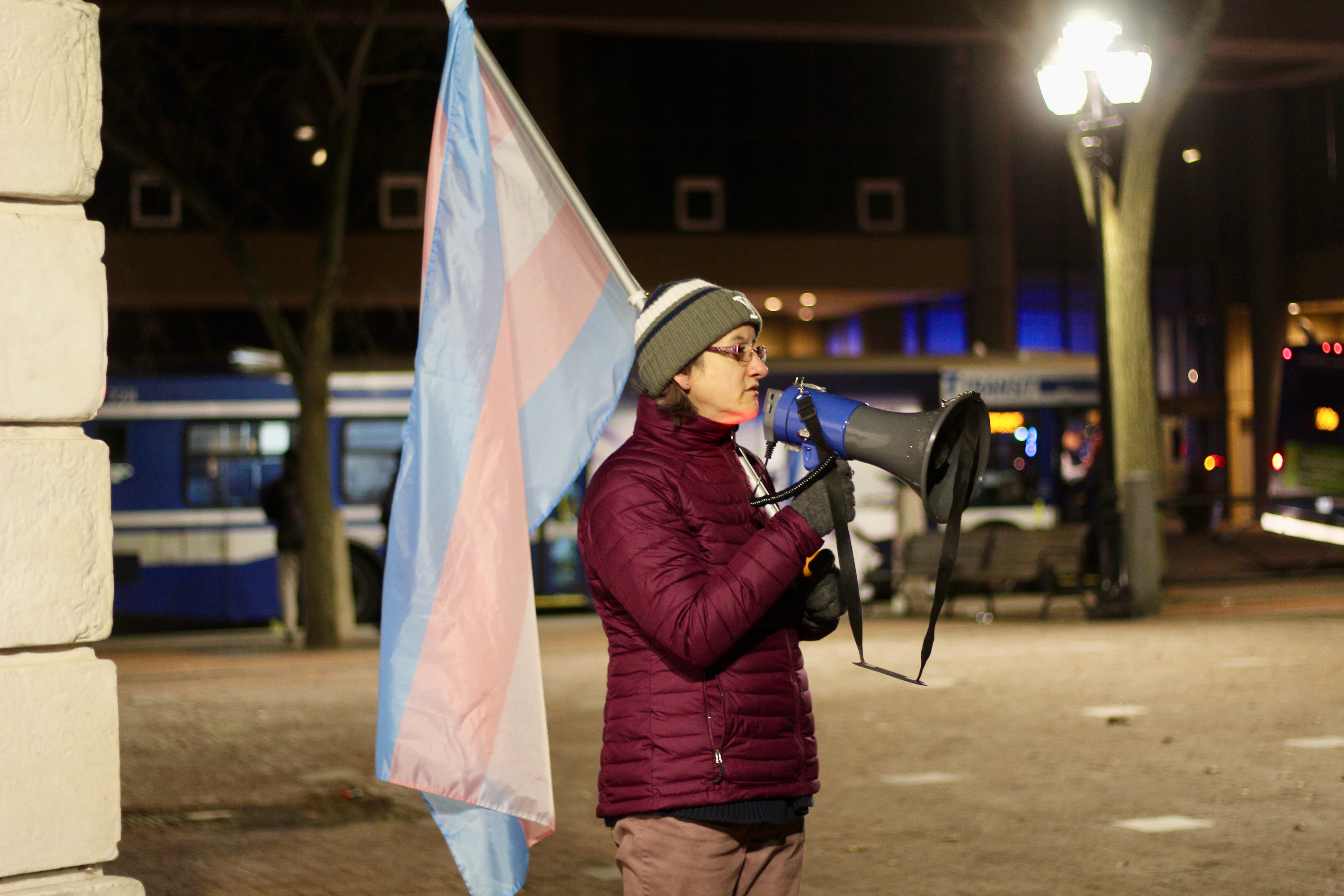
Culture & Community | New Haven Green | Transgender Awareness Week
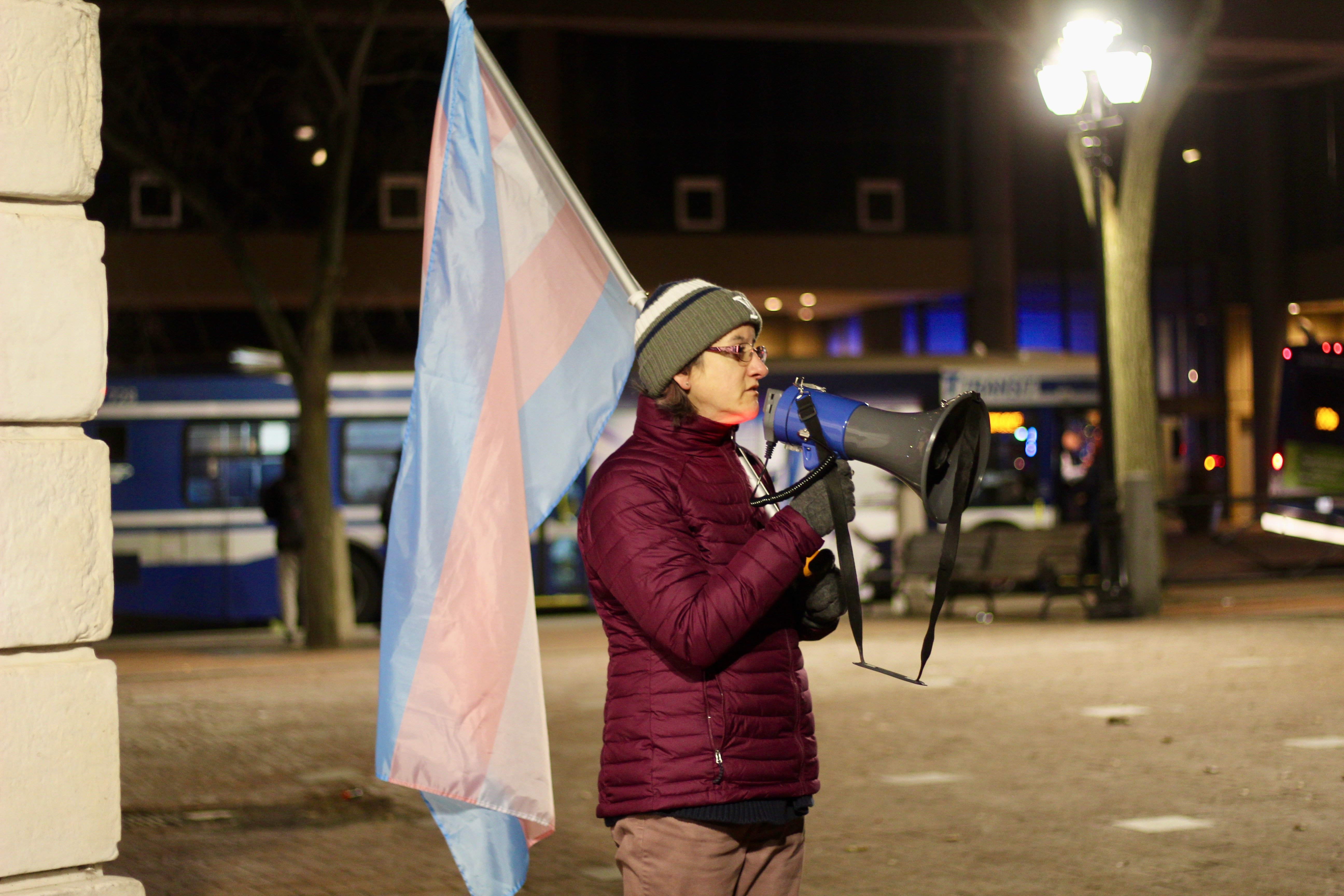
Cayetana Navarro, who now works as the inaugural program manager in the Office of Diversity, Equity & Inclusion at the Yale School of Medicine. Lucy Gellman Photos.
Cayetana Navarro stood at the corner of the New Haven Green, a blue, white, and pink flag draped over her left shoulder. Behind her, buses trundled by on Chapel Street, completely unaware of the sacred space they were disturbing with every hiss and beep. As she began to speak, she wound the clock back to the first Transgender Day of Remembrance she attended in New Haven several years ago. She’s known since that moment that she’s not alone.
Almost a decade later, that spirit keeps her coming back, even in a thick fog of grief and mourning.
Monday evening, Navarro was one of roughly four dozen people who gathered to commemorate the annual Transgender Day of Remembrance (TDOR) on the New Haven Green, as a bone-cracking cold fell over the corner of Church and Chapel Streets. Amidst electric candles and an altar laid with red fabric roses and a neatly folded trans pride flag, attendees remembered the dozens of lives lost to anti-trans violence in the U.S. alone this year.
“I saw someone post an image that said, ‘Happy Trans Day of Remembrance,’ and I didn’t really know what to do with that,” said Kirill Ivan Staklo, program director for PeerPride. “I want us to be happy. I want us to have hope. I want us to have all the good things because we deserve all the good things. But it’s okay to not be happy today. It’s okay to not be okay today. It’s normal and natural to not feel okay in a world that does not want us to be alive.”
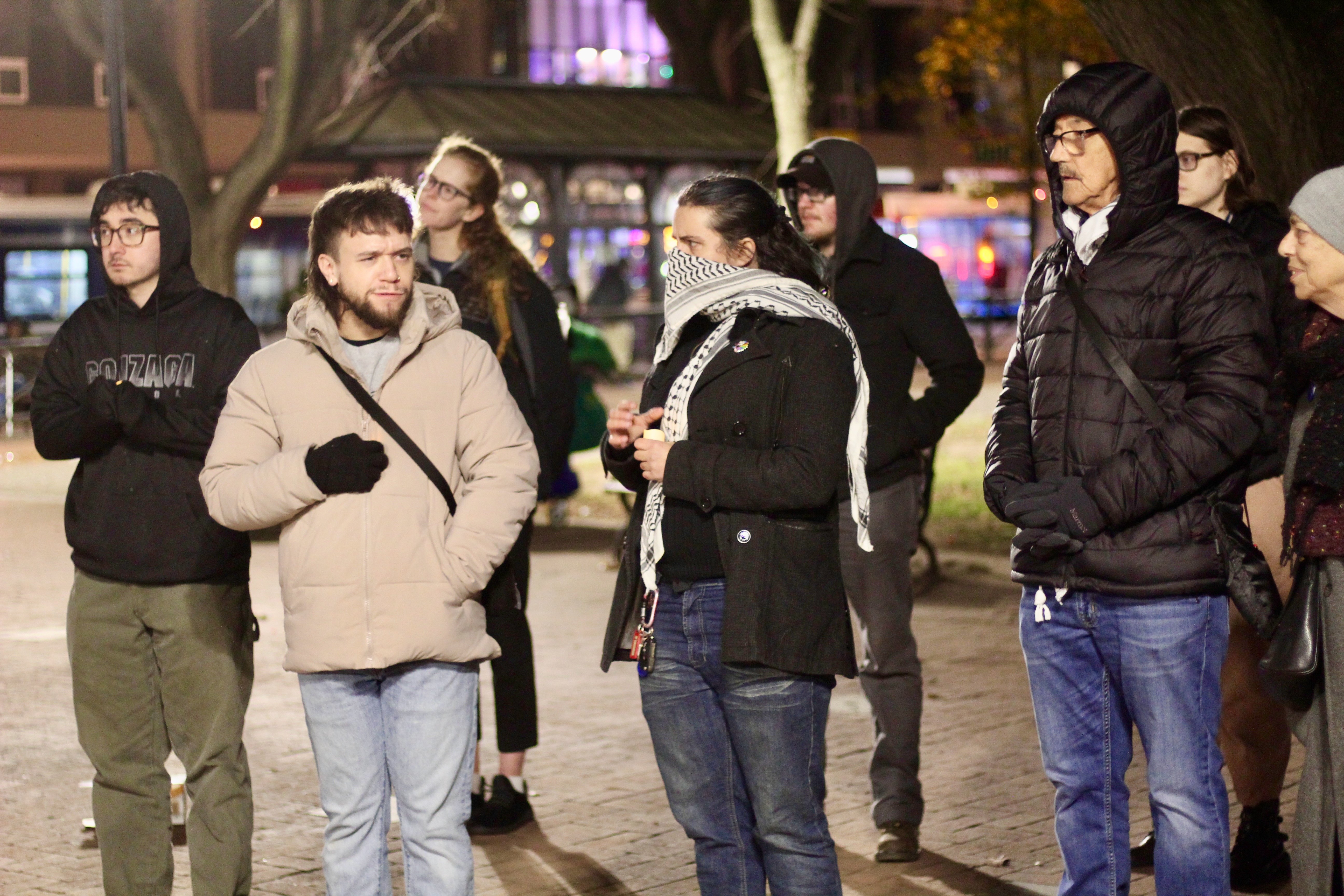
Kirill Staklo, who is a program manager for Peer Pride, with Anchor Health's Michael DeWolfe and PSL's Norm Clement.
Transgender Day of Remembrance began in 1999 to honor Rita Hester, a Black trans woman who was stabbed to death in her apartment in November 1998. Over two decades later—and as the case remains open—the National Center for Transgender Equality has reported at least 53 trans lives lost to violence in the U.S. since November of last year. Another 33 trans and nonbinary people have died in the past year of suicide.
If you or someone you know is experiencing thoughts of suicide, dial 9-8-8 for the National Suicide & Crisis Lifeline.
Of those lives lost prematurely, the overwhelming majority were Black and Latina trans women, many killed in acts of intimate partner violence. They include artists, activists, faith leaders, elected officials, beloved sisters, aunties, uncles, and daughters, all taken from the world before their time. Among them are 25-year-old Emma May, a bright-eyed Vassar grad who advocated for trans rights as a member of Wallingford’s growing LGBTQ+ community.
The center also reported that 438 trans and nonbinary people have passed away worldwide this year alone.
This year, Staklo and others noted, the news of those deaths feels particularly raw because of the sheer amount of violence in the U.S. and across the globe. Since January, state legislatures have introduced over 500 pieces of anti-LGBTQ+ legislation across the country, the bulk of it targeting trans youth and gender-affirming care. Throughout the evening, many who spoke stressed the importance of trans solidarity with people facing oppression around the globe, from those living in states barring gender-affirming care to families fearing for their lives in Gaza, Congo, and Sudan.
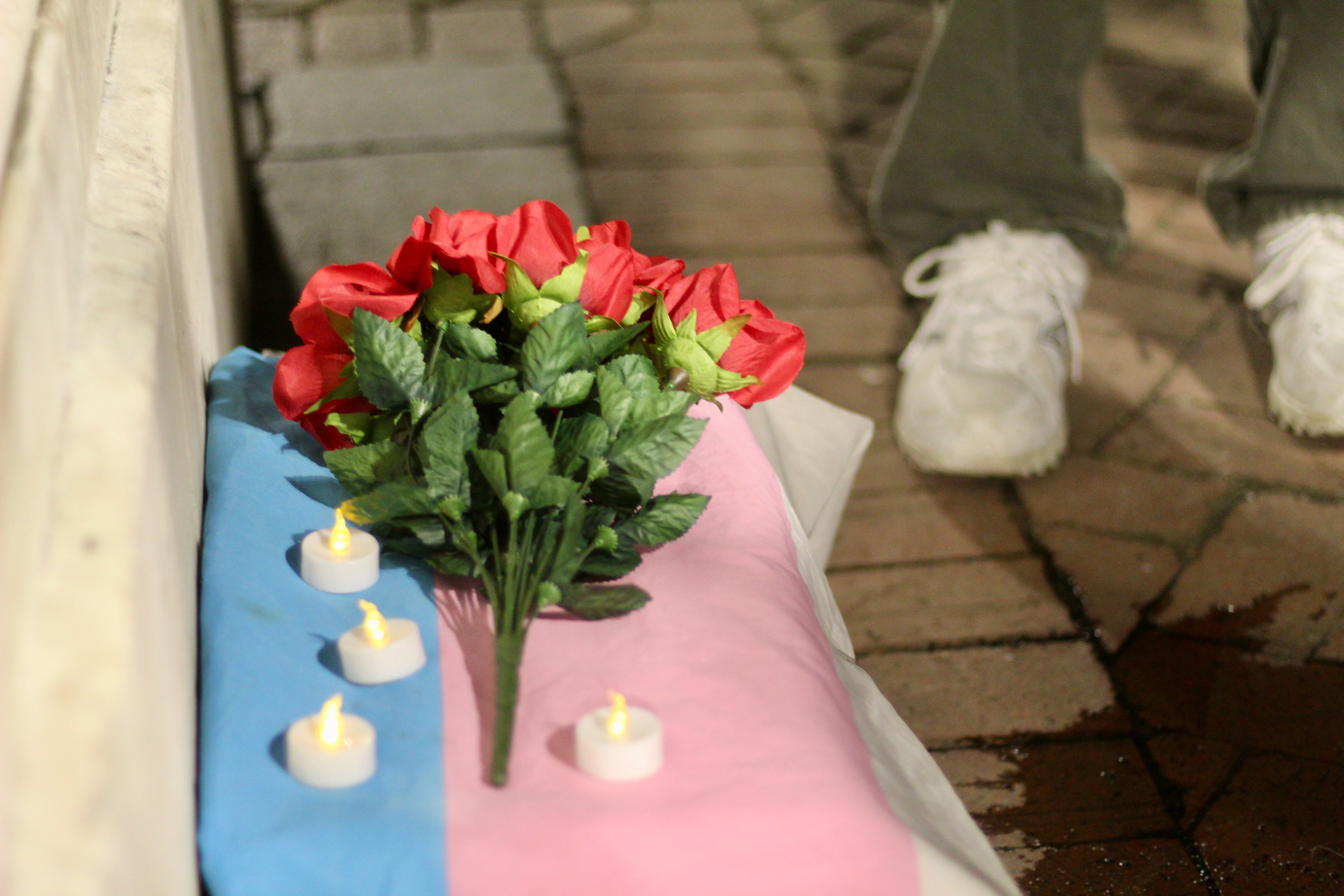
Connecticut has not been immune to that violence: a bill that died in January of this year targeted trans women and girls in sports. Last year, Republican gubernatorial candidate Bob Stefanowski also proposed a “Parental Bill of Rights” attacking both gender identity and inclusive education in the state’s public schools. Those efforts, multiple speakers noted, are also an attack on trans lives and the basic existence and human rights of trans people.
One attendee, who asked not to be named or photographed, remembered starting her transition in 2009, while living in a different state. Over 10 years later, “half of the people I’ve ever been in love with are gone,” she said, fighting back tears that ultimately came, and seemed to give attendees equal permission to cry. Scanning the dozens of faces that looked back, she emphasized the importance of actively grieving as a way to move forward.
“When we grieve, we know that love is possible,” she said.
Another attendee looked at the importance of education. Sometimes, they explained, people default to anti-trans behaviors because they are fearful of what they don’t know, or have never been exposed to something outside of their standard of normalcy.
“It’s important to reach out to people who don’t actually know what being trans entails and talking to them, and getting them to understand,” they said, stepping forward to take the bullhorn as their breath hung in white puffs around their mouth. They remembered working to educate an elderly family member, whose difficulty understanding trans rights came largely from their lack of knowledge around the subject.
Those discussions ultimately paid off: when a younger, recently-out trans family member came to them, their response was “it’s the most natural thing in the world.”
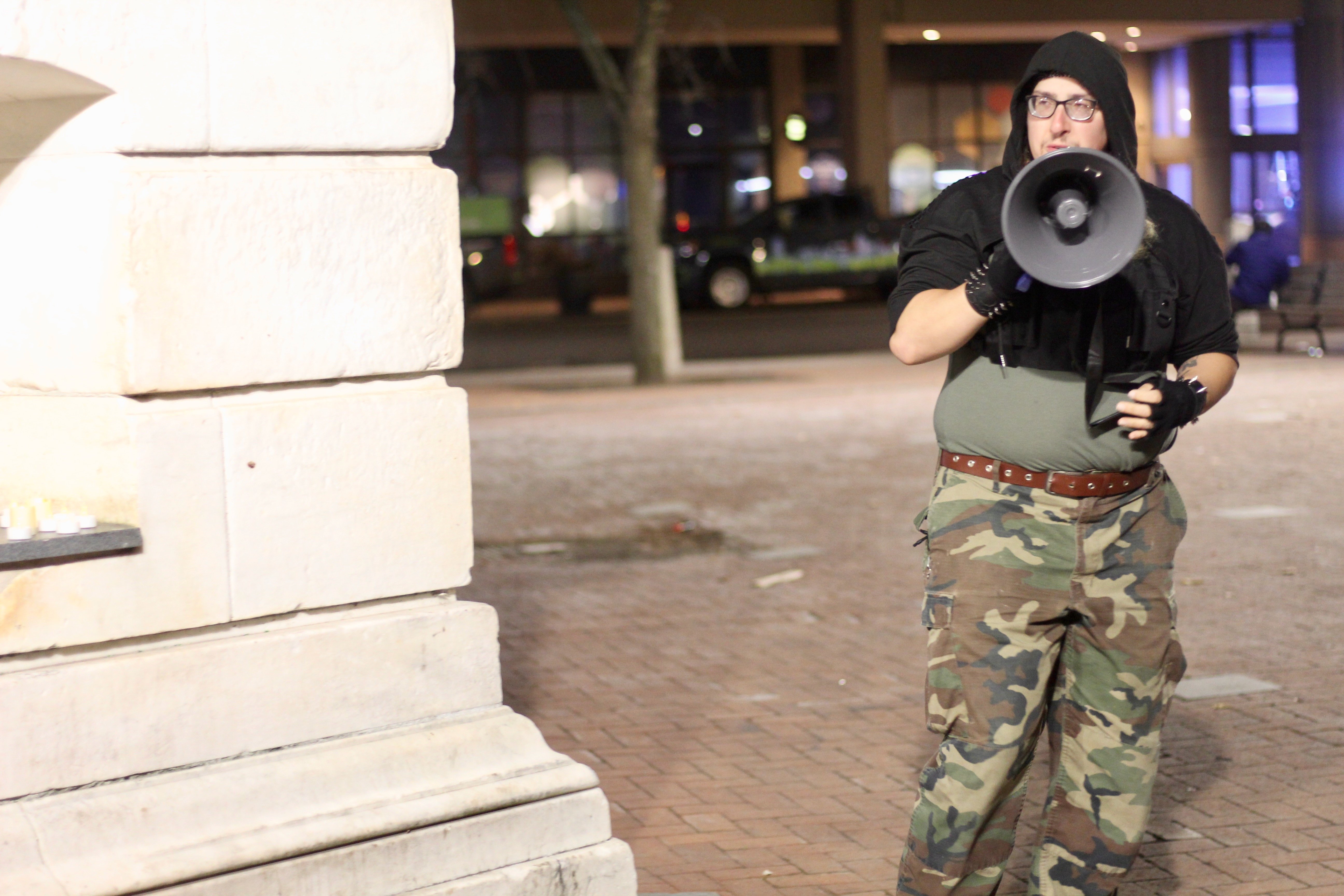
Dez Noa Volnixshin: Today is a day to remember.
Throughout, speakers also reminded attendees to give people their flowers while they are still present and very much alive, as a way to remind them of how dear they are to the world and to those who love them. Dez Noa Volnixshin, who moved to New Haven from Litchfield County last year, pointed to the sheer magic of LGBTQ+ and especially trans people, calling them divine as they took the bullhorn. As a survivor of conversion therapy, Volnixshin praised Monday’s crowd as as beautiful as it was heavy.
“The trans community saved my life, probably saved your life,” Volnixshin said. “Today is a day to remember those who have been taken from us … and also to celebrate your transness, your queerness.”
As Volnixshin spoke, PeerPride Development Coordinator Eliot Olsen wove through the crowd, handing out tiny enamel yellow roses in sweet, short and whispered exchanges with attendees. Those who had gathered, some shivering in the cold, clasped their hands around the tiny flowers, some slipping them into their pockets. A few of the yellow charms caught in the light, glittering beside tea lights that glowed inside people’s mittened and bare palms.
“I don’t want people to get comfortable showing up one day a year for us,” Olsen later said, when the small bag of roses had been emptied, and attendees were headed home with them in hand. “Every day, we’re fighting to stay alive, whether it’s in our homes or on the streets or in our workplaces.”
As people dispersed into the night and headed to Gather to keep the discussion going, Navarro said the words had resonated with her. When she moved to Connecticut in 2007, she hadn’t yet come out as trans, nor did she know the state would be her home for years to come. Since, she’s come out as a queer person and dedicated her work to the safety of fellow LGBTQ+ people in the city and the state.
As she stayed, she's slowly built a supportive community, in part from coming to TDOR gatherings that take place in New Haven each year (“I think I’ve been to just about every single one,” she said, adding that Trans Day of Visibility events are equally welcome for her, and tend to be much more joyful). She now works as the inaugural program manager in the Office of Diversity, Equity & Inclusion at the Yale School of Medicine.
“Coming to terms with being trans can be such a terrifying experience," she said. “It’s so lonely sometimes, and part of that is you see how awful it can turn out. I have a supportive family and I have a supportive workplace, so I feel duty-bound.”

